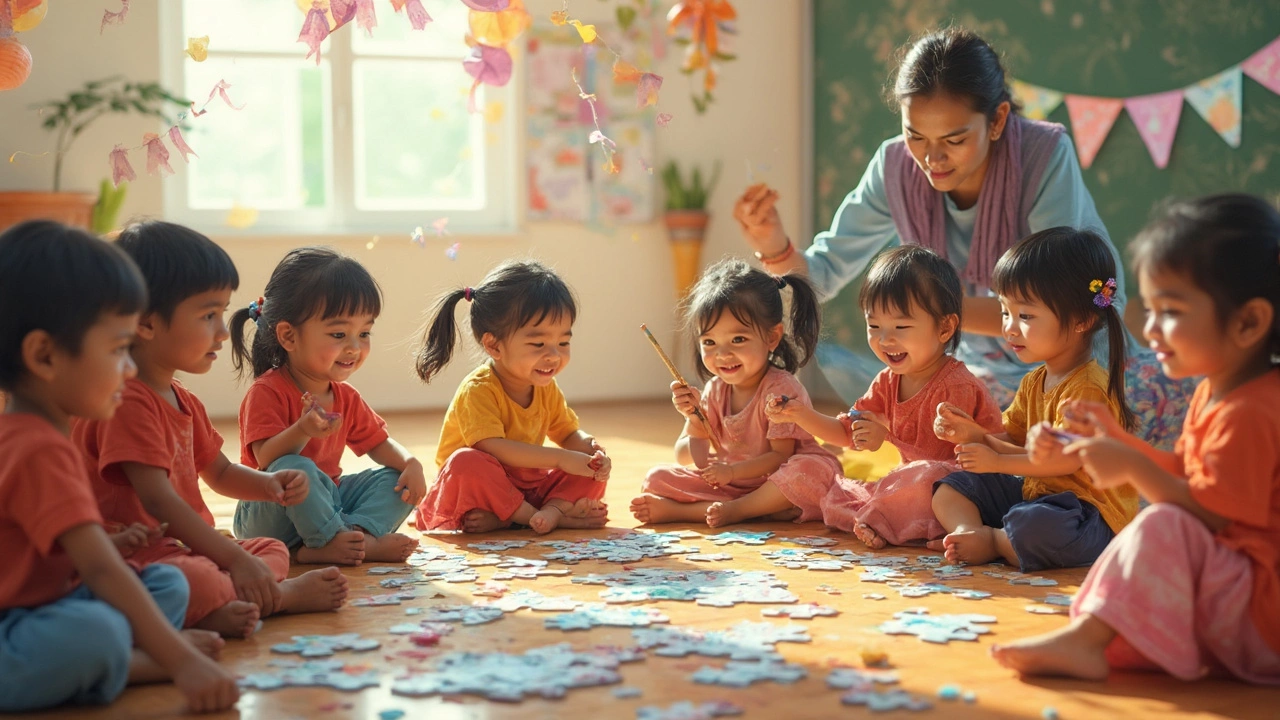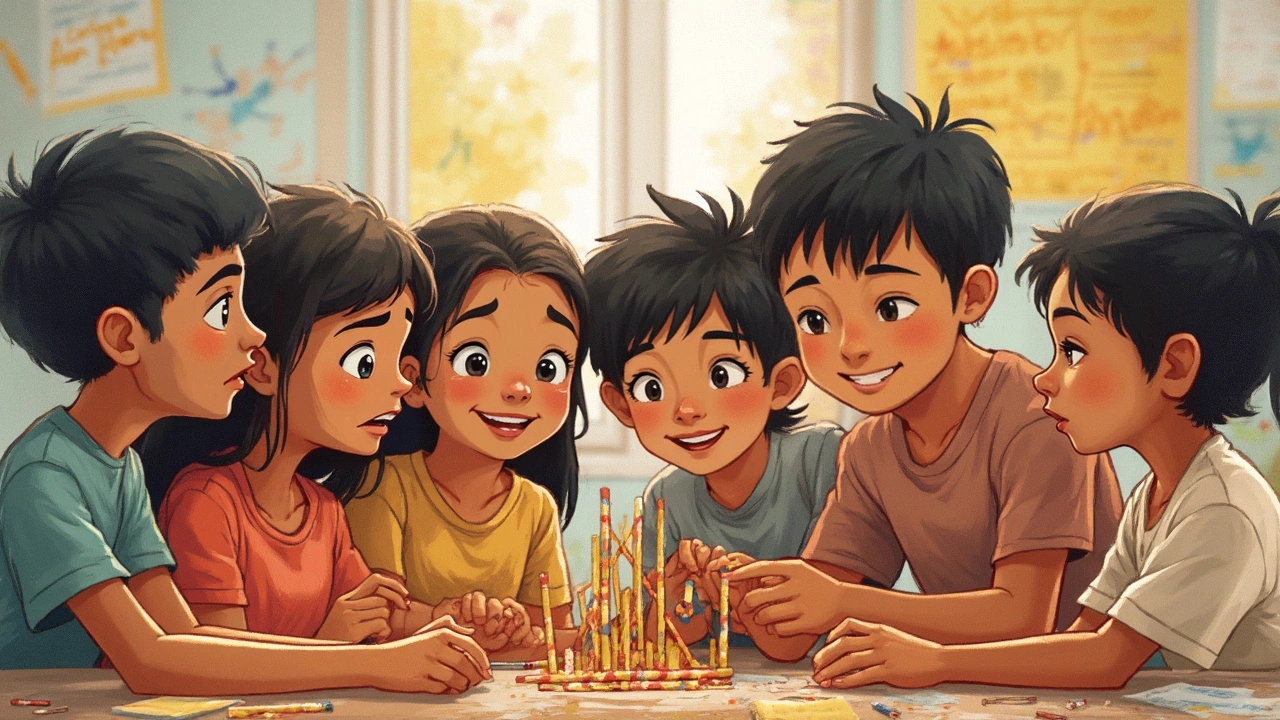The school week’s packed—lessons, tests, and enough after-school activities to leave any kid tired. So, why do Fun Fridays make such a difference? They give kids something to look forward to. Instead of bracing for another repetitive afternoon, they know Friday means snacks, games, laughter, and a chance to unwind.
If you’re leading a club or just want your child to enjoy their time after class, mixing in a Fun Friday isn’t just “nice”—it actually fuels growth. Experts say free play sparks imagination, lifts moods, and can even make kids better at solving problems. When club time isn’t just about rules or structured projects, friendships have space to grow.
Plus, Fun Fridays don’t need to be complicated. Think relay races with silly prizes, board game marathons, DIY craft corners, or even a “kids’ choice” activity. The goal: ditch the rigid schedule, let everyone relax, and see what ideas bubble up when kids are actually having fun together.
- Kids Need Down-Time, Not Just More Structure
- Fun and Play Kick-Start Real Learning
- Teamwork and Social Skills Get a Boost
- Practical Tips for Planning Fun Fridays
- The Science: Why Playtime Is Essential
Kids Need Down-Time, Not Just More Structure
Kids are slammed all week with homework, scheduled sports, and a steady stream of lessons. It’s a lot—even for adults, let alone for young brains that are still growing. After-school clubs might sound like a chill spot, but they often add more structure to already packed days. It’s no wonder that by Friday, most kids just want some time to relax and recharge.
Free time isn’t lazy or wasted; it’s where real rest happens. According to the American Academy of Pediatrics, unstructured play lowers stress, boosts mood, and actually helps kids focus better the next week. Basically, kids who get breaks are less likely to burn out or get overwhelmed by school pressure.
Look at this quick breakdown, based on data from a recent survey of kids ages 6-12, showing how kids feel by the end of the school week:
| Feeling | Percent of Kids |
|---|---|
| Tired/Drained | 64% |
| Stressed/Overwhelmed | 41% |
| Excited for Free Time | 72% |
So, what does this mean for Fun Fridays in after-school clubs? Simple: kids need a break from always following rules or sticking to plans. Letting things get a little loose on Fridays isn’t “lazy”—it’s a smart way to help kids reset. And when kids are rested, they’re friendlier, more creative, and just plain happier. That good energy carries into the weekend, making family time and even Monday mornings a bit easier for everyone.
Fun and Play Kick-Start Real Learning
Here’s something that surprises a lot of people: kids remember more and get better at problem-solving when learning feels like play. Those classic after-school club moments—like building a giant LEGO tower or turning a scavenger hunt into a mini adventure—actually wire the brain for real learning. Researchers at the University of Cambridge found that playful activities help kids learn faster than strict instruction, because play naturally builds curiosity, focus, and resilience.
What counts as Fun Fridays isn’t all just “goofing off.” Card games, trivia challenges, and simple science experiments are the kind of hands-on stuff that sneak in important skills. For example, when kids work together to solve a puzzle, they use logic, language, and social skills all at once. The best part? They don’t even realize they’re learning.
Some after-school leaders run quick group games like "Minute to Win It" challenges or DIY art projects where everyone contributes. The process teaches teamwork and creative thinking—two top skills for the real world. And the more relaxed, fun environment lowers stress, making it way easier for kids to try new things and not worry about mistakes.
Just check out what the numbers show. Here’s what teachers and researchers say happens when clubs put play first:
| Benefit of Play-Based Learning | Reported Increase |
|---|---|
| Problem-Solving Skills | Up to 40% |
| Teamwork & Social Skills | 30% higher engagement |
| Motivation to Learn | 25% boost |
No expensive equipment or fancy plans needed. Just a willingness to turn after-school clubs into a space where Fun Fridays spark joy—and real learning follows naturally.

Teamwork and Social Skills Get a Boost
When you put a bunch of kids together for Fun Fridays, something interesting happens. Without the pressure to win or perform, they start teaming up in ways you may not see in a normal classroom routine. Playing group games, making crafts, or working on silly challenges helps them build teamwork—way more naturally than in forced group projects at school.
A study by the American Academy of Pediatrics shows that unstructured play is directly linked to better social skills in kids. They learn how to share, solve problems with each other, speak up, and even handle small conflicts by themselves. During these relaxed club times, they get free practice at reading social cues and building friendships.
Sherrie West, an after-school club manager in Chicago, nailed it in a recent interview:
"On Fun Fridays, I’ve watched shy kids come out of their shell and kids that usually argue start working together. The difference is, the stakes are low and everyone just wants to have a good time."
Want to help kids boost those social muscles? Try activities that require group coordination, but keep them light. Some tried-and-true ideas include:
- Pictionary teams (great for working together and laughing off mistakes)
- Group relays where each kid adds to a story or drawing
- Board games like Jenga or Uno (no sore losers allowed!)
- Build-a-bridge challenges with popsicle sticks and tape
One survey from 2023 found that over 60% of parents saw noticeable improvements in their child’s confidence and communication skills after regular participation in collaborative after-school club activities. Let’s face it—kids remember these moments way more than another worksheet or test. That’s why Fun Fridays in after-school clubs aren’t just fun, but actually set kids up for real-world success.
Practical Tips for Planning Fun Fridays
If you want Fun Fridays to work, you need more than just a bag of snacks and hope. Getting kids hyped for these afternoons takes a little prep—but once you’ve got a groove, it’s way easier than running regular activities. Let’s break down some tried-and-true tricks for making Fridays at your after-school club a hit (without burning yourself out).
- Poll the Kids. Ask what they actually want to do. Write up a simple list of activities—board game tournaments, movie time, team sports, or cooking classes—and have them rank their faves. Kids are more excited if they get a say.
- Keep It Flexible. Unlike weekdays stacked with schedules, Friday works best if you allow for some freedom. Try open-ended stations: one for crafts, one for active games, another for building with blocks or LEGOs. Kids can roam and pick.
- Rotate Themes. Make each Fun Friday feel special with a new theme: Pajama Day, Science Mess Day (hello, safe explosions!), or even Karaoke. This keeps things fresh and stops anyone from getting bored of the same routine.
- Mix Up Groupings. Every now and then, shuffle the groups for games or crafts. Studies show kids build social skills faster when they aren’t always stuck with the same clique.
- Keep Supplies Simple. Cheap goes a long way—think balloons, sticky notes, old magazines, pitchers of lemonade, or a pack of Uno cards. Don’t break the bank trying to entertain.
Here’s something surprising: According to a 2023 US survey, 72% of parents say their child is happiest in unstructured group activities, especially at after-school clubs. So, a little chaos is not only fine, it’s actually what works.
| Activity Idea | Setup Time | Cost (approx.) |
|---|---|---|
| Board Game Tournament | 5 minutes | $0 (use club’s games) |
| Obstacle Course | 15 minutes | $10 (cones, rope) |
| DIY Crafts | 10 minutes | $5 (recyclables) |
| Pajama/Movie Day | 5 minutes | $1-5 (popcorn) |
Most important? Have fun yourself. If you’re relaxed and joining in, the kids will catch the vibe right away. Before you know it, Fun Fridays will be the week’s highlight for your club—and for you too.

The Science: Why Playtime Is Essential
All week kids juggle homework and activities that demand focus, but their brains can’t grow without breaks for genuine play. Tons of research now shows that unstructured playtime is as vital as lessons or chores—maybe even more. In fact, the American Academy of Pediatrics says play helps kids build creativity, decision-making skills, and emotional strength. They call it “essential to development.”
Here’s what happens behind the scenes: when kids take part in Fun Fridays at after-school clubs, their brains light up in ways that lectures and worksheets just can’t deliver. Active play gets their hearts pumping, which boosts blood flow and helps memory. Laughing and goofing off together teaches them how to manage stress and bounce back after tough days.
Socially, play is where kids practice teamwork, taking turns, and reading others’ feelings. That’s not just “nice to have”—it directly impacts how well they get along with friends and classmates. Many schools that cut out recess or free moments to make more room for academics actually see kids’ behavior and attention plummet.
Check out what the numbers say about play’s impact on kids, gathered from several studies and recent surveys:
| Benefit | What the Science Shows |
|---|---|
| Better Brain Function | Kids who get regular play breaks score up to 17% higher on problem-solving tests compared to peers with less playtime. |
| Lower Stress | Free play can reduce cortisol (the stress hormone) by up to 31% in grade school children. |
| Stronger Friendships | Children who play together at least once a week are 25% more likely to describe themselves as having “lots of friends.” |
So if you’re on the fence about setting up Fun Fridays, remember you’re not just giving kids a break—you’re giving them an edge, socially and academically. Play isn’t just for fun. It’s fuel for growing up healthy and ready for anything.
